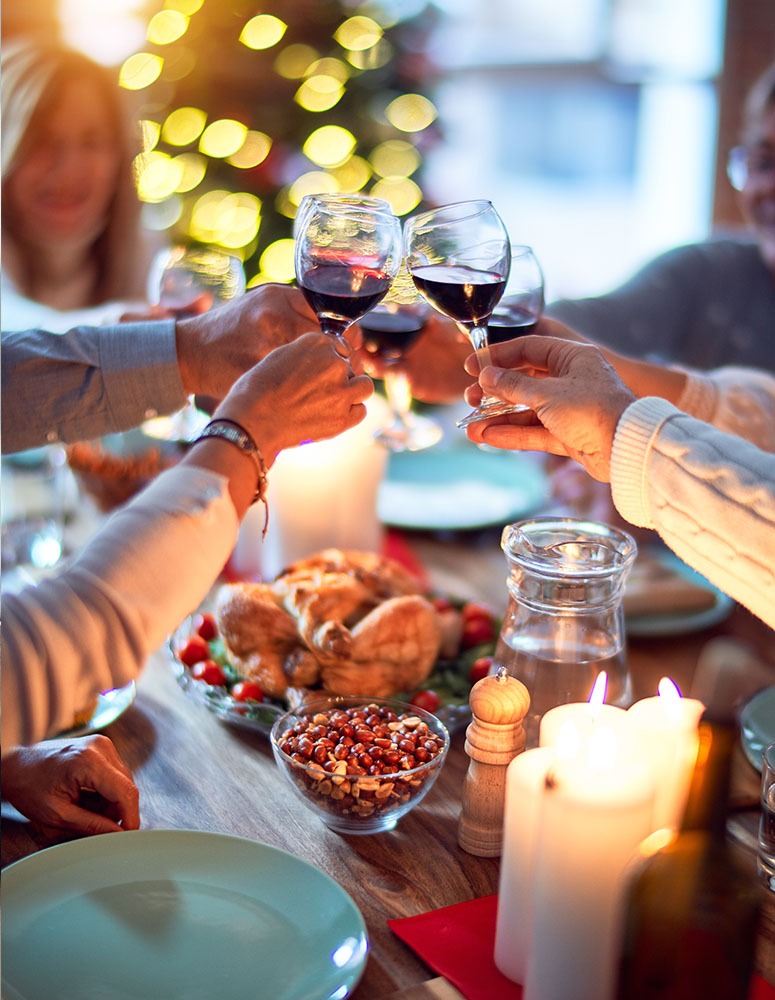Mindful Eating for the Holidays
This is the time of year when we collectively give ourselves permission to “Eat, drink, and be merry!” Indeed, gathering with family and friends over seasonal treats like eggnog and mixed drinks, heavy appetizers, roasted meats with all the fat-laden side dishes, followed by holiday cookies, breads, pies, cakes, candies, and desserts, are among the joys of the season. Taken together, they make over-indulgence easy and mindful eating elusive.
Nevertheless, there are relatively easy steps you can take to avoid indigestion, weight gain, and a hangover. Rather than focusing on restricting yourself, I recommend reframing your approach to holiday eating as one of mindfulness, not denial. You’re choosing consciously—threading a path between your desire to be healthy and your desire to have fun and enjoy yourself.
Here are 8 tips for mindful holiday eating:
- Give yourself permission to savor what you love. If you follow the path of moderation, you can allow yourself to enjoy your favorite food and drink, but not overdo it. Savor each delicious mouthful, rather than stuffing yourself. Make it last; don’t rush through. Slowing down not only increases your enjoyment of your food; it gives your body the time it needs to signal to your brain when you’re full and have had enough.
- One technique for doing this is to put your fork down after each bite. Use that time to chew, taste, and swallow. And then, before picking up the fork again, continue the conversation you’re having with a fellow guest. Celebrations are about the people, as well as the food!
- Remember the difference between anything and everything. On special occasions when you are relaxing the rules, give yourself permission to eat anything you want, but perhaps not everything you want! Say yes to eggnog OR pie, perhaps not to eggnog AND pie! That way you won’t overdo it.
- Consider the law of compensation. If you do over-indulge and consume both the pie and the eggnog (and the heavy appetizers and the after-dinner drinks) on one occasion, remember that you can compensate—either by eating healthfully and less than your usual amount the day before or the day after.
- Make your first beverage water. By filling your first glass with sparkling water instead of beer, wine, or a cocktail, you’ll fill yourself up—and also guard against the dehydration that can accompany and worsen alcohol consumption.
- Limit alcohol. I’d recommend forgoing it entirely—especially if you’re driving. Alcohol takes the edge off your inhibitions (which is why we enjoy it), but that makes mindfulness more difficult and over-eating easier. Alcohol is also a depressant, so you can end up paying for your “high” with a commensurate “low.”
- Fill most of your plate (and stomach) with vegetables. If you have a choice about what you’re served, fill most of the real estate on your plate with salads and cooked vegetables, then add proteins and carbohydrates around the edges. Doing so will minimize your calorie and fat intake. (Until dessert, that is!)
- Celebrate the social aspect of the occasion. Mindful eating gives us a chance to remember that the “reason for the season” is to share joy with friends and family. By consciously focusing on the opportunity to talk with old friends, make new ones, laugh, dance, sing songs, play games, exchange gifts, and enjoy other forms of merry-making, we put food and beverage consumption where it belongs: as a complement, rather than the point, of our celebration.
Wishing you a happy, healthy, holiday season!
DISCLAIMER: The information provided on this site is intended for your general knowledge only and is not a substitute for professional medical advice or treatment for specific medical conditions. You should not use this information to diagnose or treat a health problem or disease without consulting with a qualified healthcare provider, who should also be consulted with any questions or concerns you may have regarding your condition.
